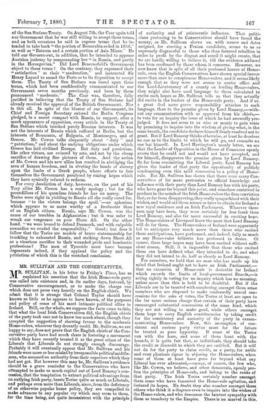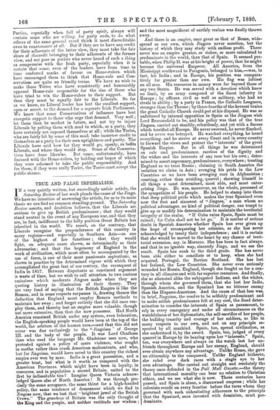MR. SULLIVAN AND THE CONSERVATIVES.
M. SULLIVAN, in his letter to Friday's Times, has so explained his assertion that the Irish Home-rule party was called into existence and, in its earlier days, fostered, by Conservative encouragement, as to make the charge one which does not press very heavily on the English chiefs. We admit that it is strange that Colonel Taylor should have known so little as he appears to have known, of the purposes and policy of some of his most intimate political allies in Ireland. Still, on the whole, we suppose the facts come to this, that what the local Irish Conservatives did, the English chiefs of the party took care not to know too much about, though they accepted the suggestion of showing favour to the moderate Home-rulers, wherever they decently could. Mr. Sullivan, we are happy to say, does not prove that the English chiefs of the Con- servative party have had much share in fostering a movement which they have recently treated it as the great crime of the Liberals that Liberals do not strongly enough discourage. Probably it will eventually appear that Mr. Sullivan and his friends were more or less misled by irresponsible political middle- men, who assumed an authority from their superiors which they had not got. But however this may be, Mr. Sullivan's evidence should be a grave reminder to the Conservatives who have attempted to make so much capital out of Lord Ramsay's con- cession, that the temptation to extract political advantage from an outlying Irish party, besets Tories quite as much as Liberals, and perhaps even more than Liberals, since, from the deficiency of an otherwise popular home policy, they are compelled to make advances to any popular cry which may seem to them, for the time being, not quite inconsistent with the principle of authority and of aristocratic influence. That politi- cians professing to be Conservatives should have found the money, as Mr. Sullivan shows us, with names and dates assigned, for starting a Fenian candidate, seems to us so supremely disgraceful to those who thus fostered rebellion in order to profit by the disgust and recoil it might create, that we arc hardly willing to believe it, till the evidence adduced has been confirmed by those whom it concerns. However, we now know that in spite of all their professed horror of Home- rule, even the English Conservatives have shown special favour more than once to conspicuous Home-rulers, and it seems likely enough that as they were not averse to confer office and the Lord-Lieutenancy of a county on leading Home-rulers, they might also have used language to them calculated to excite such hopes as Mr. Sullivan tells us that they actually did excite in the leaders of the Home-rule party. And if so, a great deal more grave responsibility • attaches to such language, than to the promise given by Lord Ramsay,—with- out any communication with or approval from his chiefs,--. to vote for an inquiry the issue of which he had avowedly pre- judged. It does not seem to us wise or manly to gain votes by promising to inquire into the wisdom of giving what, in the same breath, the candidate declares himself firmly resolved not to grant. But if Lord Ramsay thinks otherwise, at least he deceives no one as to the limits to which he will go, and commits no one but himself. In Lord Hartington's manly letter, we see that the Leader of Opposition in the House of Commons openly avows that he could not and would not have accepted, and for himself, disapproves the promise given by Lord Ramsay. So far from committing the Liberal party, Lord Ramsay has given the leader of that party the opportunity of publicly condemning even this mild concession to a policy of Home- rule. But Mr. Sullivan has shown that there were many Con- servatives of far more pretension to official knowledge and influence with their party than Lord Ramsay has with his party, who have gone far beyond this point, and somehow contrived to produce in the minds of the Irish Home-rulers the firm conviction that, so far from disapproving, they really sympathised with their wishes, and would aid them sooner or later to obtain for Ireland a new royal residence and an Irish Parliament. Whoever these men may have been, they were certainly far less frank than Lord Ramsay, and also far more successful in exciting hope. The Home-rulers of Liverpool know the most that Lord Ramsay will do for them. The Home-rulers of Ireland were apparently led to anticipate very much more than those who excited these anticipations, have performed, and, indeed, fully as much as any Home-ruler hitherto has professed to desire. Of course, these large hopes may have been excited without suffi- cient reason. Still, it is impossible that those who excited them can have defined what they intended to do, and what they did not intend to do, half as clearly as Lord Ramsay.
For ourselves, we hold that no man who has made up his mind that Ireland ought not to have an Irish Parliament,— that no extension of Home-rule is desirable for Ireland which exceeds the limits of local-government Boards,—is acting rightly in voting for an inquiry which has no meaning, unless more than this is held to be doubtful. But if the Liberals are to be taunted with numbering amongst them some members who are disposed to make confessedly unreal con- cessions for the sake of votes, the Tories at least are open to the far more serious charge that certain of their party have encouraged substantial concessions of the same kind, which they are not willing to make good, while others amongst them hope to carry English constituencies by taking credit for the consistency and austerity of the party in excom- municating Home-rulers. Now, this assumption of con- sistent and austere party virtue must for the future be treated as pure hypocrisy. If some of the Tories run with the hare, and some of them hunt with the hounds, it is quite fair that, as individuals, they should take the credit or discredit to which they are entitled. But it will not do for the party to claim credit, as a party, for noble and evert pharisaic rigour in abjuring the Home-rulers, when some of them at least have gone far beyond what any Liberal has ever advocated,—except, of course, the few who, like Mr. Cowen, we believe, and other democrats, openly pro- fess the principles of Home-rule, and belong to the ranks of that party. The Irish Tories certainly number amongst them some who have fomented the Home-rule agitation, and fostered its hopes. No doubt they also number amongst them others who think it a disgrace even to inquire into the wishes of the Home-rulers, and who denounce the faintest sympathy with them as treachery to the Empire. There is no marvel in this. Parties, especially when full of party spirit, always will contain some who are willing, for party ends, to do what others of the same general creed think it most discreditable even to countenance at all. But if they are to have any credit for their adherents of the latter view, they must take the fair share of discredit belonging to their adherents of the former view, and not pose as purists who never heard of such a thing as compromise with the Irish party, especially when it is certain that some, even of the leaders, have from time to time conferred marks of favour on Home-rulers, which have encouraged them to think that Home-rule and Con- servatism are quite on friendly terms. We have no wish to make those Tories who have consistently and honourably opposed Home-rule responsible for the sins of those who have tried to win the Home-rulers to their support. But then they must be equally fair to the Liberals. So far as we know, no Liberal leader has lent the smallest support, open or secret, to the demand for a separate Irish Parliament. We know that some Conservatives of influence have lent energetic support to those who urge that demand. Very well ; let them then be modest in future, and not try to injure Liberals by pelting them with mud to which, as a party, they have certainly not exposed themselves at all ; while the Tories, who are fairly hit by some of this mud, take immense credit to themselves as a party for their own uprightness and purity. The Liberals have said how far they would go, openly, as befits Liberals, and where they would stop. Some of the Conserva- tives have done likewise. But some, unfortunately, have finessed with the Home-rulers, by holding out hopes of which they were ashamed to take the public responsibility. And for these, if they were really Tories, the Tories must accept the public shame.



































 Previous page
Previous page